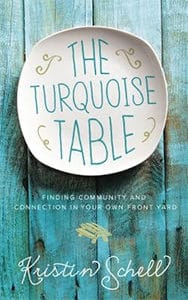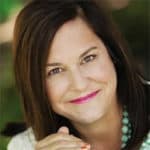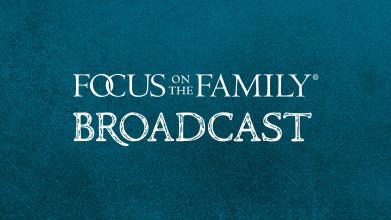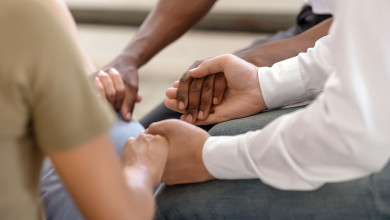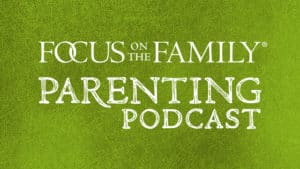Preview:
Kristin Schell: Maybe this table should stay in the front yard and maybe, you know, we could start doing our ordinary activities, dinner, pizza on, you know, paper plates, homework, bubble blowing, you know, things that our family was already doing. But what if we were to do it in a more visible way- … and do it in the front yard.
End of Preview
John Fuller: That’s Kristin Schell. And today on Focus on the Family, you’ll hear her unique story about how she began loving her neighbors in a more intentional way. Your host is Focus president and author Jim Daly, and I’m John Fuller.
Jim Daly: Uh, John is so easy to drive in and out of our garages and not get to know our neighbors. And I think it takes away from what the Lord can do through you in your neighborhood to touch people in his name. And, uh, we’re gonna discuss that today with a very special guest. This is one of those programs that, uh, should equip you to think a little differently. I think help train your children as well. How to look at the world around them and have an impact in the name of Christ.
John: Yeah, this is a fun, unique, and inspiring story about ways that you can show hospitality. And our guest is, as I said, Kristin Schell, uh, she’s the author of the book, The Turquoise Table, Finding Community and Connection in Your Own Front Yard. And, uh, she and her husband, Tony have four children. They live with their family in Austin, Texas.
Jim: Kristin, w- welcome to Focus on the Family.
Kristin: Thank you. I’m delighted to be here.
Jim: Hey, before we dive into The Turquoise Table, um, I wanna go back to what started your love for food and fellowship around the table, which I think is an important part of your story. And it’s my understanding, it started with receiving an F in high school.
Kristin: Yes.
Jim: Now, are you fessing up to that?
Kristin: I’m gonna fess that.
Jim: You told thousands of people now.
Kristin: Right, well, lead with your failure, right? (laughs).
Jim: Okay (laughs). Well, let’s do it (laughs).
Kristin: So (laughs), so let’s do it. Let’s just-
Jim: Let’s just-
Kristin: … get it all out.
Jim: … what did you get an F in?
Kristin: French.
Jim: (laughs) well, I can understand that.
Kristin: I failed French.
Jim: I can totally understand that.
Kristin: You know, and then the, the world’s problems, this is not high up there-
Jim: Mm-hmm.
Kristin: … but when you are in high school-
Jim: (laughs)
Kristin: … and you’re gonna have that glaring F on your transcript-
Jim: Oh yeah.
John: Yeah.
Jim: … you know.
John: And it’s gonna follow you around.
Kristin: It’s gonna follow you around, anyway. Er-
Jim: Okay. So how did mom and dad respond to that when you came home?
Kristin: Well, they were nervous because-
Jim: (laughs) I bet they were (laughs).
Kristin: … you know, they’re like, “Okay, first of all, it’s French,” you know, so it’s not like-
Jim: Mm-hmm.
Kristin: … it was math, or it was English-
Jim: Mm-hmm.
Kristin: … or something. It was French, but you know, it was, it was a failure. And so, they tried like good parents. They were like, “Well, let’s get tutors. Or, you know, maybe if we help her out,” well, let me just, tell you, there was no help in this out. My brain for whatever reason was not going to learn the language. And so, this is, is crazy, but on a sort of this last-ditch effort, they sent me on a summer immersion program in France.
Jim: (laughs)
Kristin: Right?
John: Uh-huh (laughs).
Jim: They were committed (laughs).
Kristin: They were committed.
Jim: Man (laughs).
Kristin: Well, the school, the school, the teachers were committed, I’m their first child. And so, they didn’t know, they didn’t want to mess up. They were-
Jim: (laughs)
Kristin: … all nervous, but here’s the thing, like, that sounds like a dream. Oh, and you know, sort of a bless your heart. As we say in Texas.
Jim: Yeah, really.
Kristin: You know, to go to France, but I hated sleepover camp. I didn’t like to spend the night out. And so-
Jim: Oh my (laughs).
Kristin: … you know, like leaving, I’m a uh, I was a homebody. And so, you know, going to France-
Jim: Mm-hmm.
Kristin: … you know, to stay with a family and live in a country where clearly, I couldn’t speak. And so, it, it was not, it was a nightmare for me.
Jim: (laughs)
Kristin: Um, but at the ripe old age of 15, I found myself in a teeny, tiny town-
Jim: Oh, my goodness.
Kristin: … living with a family and not understanding a word.
Jim: W- what, w- what would you like to say to your mom and dad today?
John: (laughs)
Jim: (laughs)
Kristin: Today I would tell them, thank you. At the time. You know, I, clearly thank you was not-
Jim: (laughs)
Kristin: … on my lips or in my heart, but, um, but thank you because you know what I learned, and of course, I didn’t know this at the time, but what I learned was that hospitality, the Greek root of that, and it means love of strangers.
Jim: Huh.
Kristin: And so, I was a stranger in a foreign land, clearly not understanding the language and-
Jim: Mm-hmm.
Kristin: … I’ve never felt so loved. And-
Jim: Mm-hmm.
Kristin: … like I belonged at the table.
Jim: Huh.
Kristin: And it was, you know… now I can look back and go, “Aha. That’s what God was doing,” at the time, of course, you know, it was muddied. And I didn’t, I didn’t understand that.
Jim: Sure.
Kristin: But the food and the ritual of sitting at the table, the French have it going on. And I mean, they sit at the dinner table two hours at night, um, and-
Jim: Very relaxed.
Kristin: Very relaxed, and they, conversation flows. Now, I remember, I couldn’t understand a lot of it, but I knew that what was happening around that table was something, uh, I mean, it was, it was contagious, and it was enthralling. And I knew that it was something I wanted to be a part of.
Jim: Mm-hmm.
Jim: The, the whole Mediterranean culture is like that too. I’ve had the pleasure of being in Spain and France and other places, but there is a different pace.
Kristin: Right.
Jim: And it’s a beautiful one.
Kristin: Right.
Jim: And one that we should embrace here in the United States, more so rather than the hurry up, we grade ourselves on how fast we can eat.
Kristin: Exactly.
Jim: And we get an A plus if we’re, like, down to 10 minutes, we could do dinner in 10 minutes.
Kristin: Exactly.
Jim: We can microwave it, put it on the table, quickly, eat it, talk to each other for a couple of seconds. And then we’re done and off to our sporting events.
Kristin: Right. And that’s where I was growing up, you know, ’cause this was my soph, after my sophomore year in high school. And, and so that’s the world that already, even in the ’80s I was living in-
Jim: Mm-hmm.
Kristin: … you know, a very fast paced, you know, life. And so, it, more so than the language, which by the way, I ended up being a French major, but more than mastering the language-
Jim: You were right in your weakness (laughs).
Kristin: … I did go right to my weakness, but well, this is what God does, right?
Jim: (laughs)
Kristin: But, but m- more than mastering that language, it was the lifestyle. It was the, you know, eye-to-eye, you know, good conversation. Food is nourishment for the soul. And just that family time around a table.
Jim: And you encourage us to embrace it rather than run from it.
Kristin: Right.
Jim: Now, some of us can be a bit fearful of that much time with each other as family (laughs).
Kristin: Right, right. Well, and I get that, you know, I mean, and, and my context for that much time with family was the holidays. Right? You know, but certainly not every single night, no.
Jim: So, what… You ended up ordering a table. Tell me about-
Kristin: Right.
Jim: … the story of The Turquoise Table?
Kristin: So, flash-forward, you know-
Jim: Mm-hmm.
Kristin: … many, many years later. And so, Tony and I are married, we’re living in Austin and, and at the time our children were sort of middle school aged and, um, life was busy. It was the exact thing we just talked, you know, onto the next, sports practices, all good things, right?
Jim: Right.
Kristin: But I felt like, uh, I was spending more time in my minivan than I was at the kitchen table. And I still had that longing, that seed that was planted all those years ago in France, but I couldn’t figure it out. You know, couldn’t figure out when to cook, how to bring people, you know, to the table. And then often, you know, when I would bring them to the table, I was so tired from cooking-
Jim: Mm-hmm.
Kristin: … and trying to get everyone there that I wasn’t a very kind person (laughs) or a good hostess.
Jim: Mm-hmm.
Kristin: And so, I felt like, again, I was failing.
Jim: Yeah. Uh, so how did you get the idea of a picnic b- bench and what happened?
Kristin: So, this, uh, I mean, again, it was, it was kind of on a whim. I was having a- a party with the neighbor and a friend of mine and I needed an extra place to seat some people. We were doing a barbecue and, um, it was in the backyard. So, it was very casual. And so, I ordered a picnic table. I mean, this is just a plain old table. Like everybody has seen the wooden picnic tables and, uh, I ordered it from Lowe’s because they could deliver it and have it-
Jim: (laughs)
Kristin: … assembled the next day. And that’s what I needed. And it was under 100 bucks. So that made Tony happy, and-
Jim: It was all getting good.
Kristin: … it was all getting good. And so, when they delivered it, it’s heavy, picnic tables are heavy. They put it outside right next to the edge of our street, kind of underneath this Magnolia tree.
Jim: In the front yard.
Kristin: In the front yard.
Jim: (laughs)
Kristin: And then they came to get me to ask where I wanted it.
Jim: Mm-hmm.
Kristin: And so, when I walked out to follow the delivery guys, I saw that picnic table underneath the tree. And it was an aha moment. It re-
Jim: Huh.
Kristin: … it took my breath away because I had been, sort of, in this holy restlessness for five or six years, trying to figure out how to offer hospitality, how to get to know my neighbors, how can I do all this? And I saw that table, and I know it sounds crazy, but I was like, “This is it. Maybe this table should stay in the front yard. And maybe, you know, we could start doing our ordinary activities, dinner, pizza on, you know, paper plates, homework, bubble blowing.” You know, things that our family was already doing. But what if we were to do it in a more visible way.
Jim: Huh.
Kristin: And do it in the front yard. And, um-
Jim: Well, that’s so counterintuitive.
Kristin: It is very counterintuitive.
Jim: I’m just certainly going, “Why would I wanna do that”” (laughs).
Kristin: Why would you wanna do that? I get it, I get it.
Jim: (laughs)
Kristin: And, and so when I went in and explained to the children and to, and to Tony, um, you know, Austin’s motto, our kind of our self-proclaimed motto, um, for Austin is, Keep Austin Weird.
Jim: Yeah.
Kristin: And I think-
Jim: That fits.
Kristin: It does fit.
Jim: (laughs)
Kristin: And so, I figured, you know, they’re like good mom, you know, but p- picnic table in the front yard doing your part to keep Austin weird. But to me, it was like, what if it became, like, the old village well, you know, where we weren’t burdened by the pressures of entertainment.
Jim: Huh.
Kristin: So, I’m no longer now worried about cooking for people. The house doesn’t have to be clean, you know, ’cause people are gonna be in the front yard, but it, it, it caught on y’all. It just, it, it became a thing in our neighborhood.
Jim: So, what happened? You sit down that first day and what are you thinking should happen? What’s your expectation?
John: Hmm.
Jim: And then what does happen?
Kristin: So, here’s a little teeny bit more of, of the backstory too, was I, I knew that I need, I call it a great hospitality hack. Like I said, like I didn’t, we, you know, we wanted to kick perfection to the curb. I, you know, I knew I wanted to bring people together, but I didn’t want it to always be a thing. You know, a book club, a Bible study, a supper club, because that overwhelms people. Um, and so I thought, “Okay, what if we were to do something and just be present? What if we were to slow down long enough and just be present in each other’s lives?” And I did not know about, I’d never heard the term ministry of presence before.
Jim: Hmm.
Kristin: And so through just r- reading and, and great discipleship, I, um, I’ve, I’ve, I’ve learned about the ministry of presence, which is also very counterintuitive because-
Jim: And-
Kristin: … we’re wired-
Jim: Yeah, hard.
Kristin: … to be, you know, human doings.
John: Mm-hmm.
Jim: Yes.
Kristin: But what this message was to me was just human being. Like, what if, what if we were to take 15 minutes, 20 minutes and just be present with one another? Like what could happen? Okay. That’s weird Right? You know-
Jim: Yes.
Kristin: … like, “Okay.” So, I thought, “Well, I’m gonna go outside and just be present in my front yard at a turquoise picnic table. Like I’ve lost my marbles.”
Jim: Well, that’s the other point you ended up painting it.
Kristin: I painted it turquoise.
Jim: Your favorite color.
Kristin: Because it’s my favorite color.
Jim: Yeah.
Kristin: Right. And so now you’ve got, I mean, eh, er-
Jim: So, a nice dark wood would be, you know-
Kristin: M- maybe, but then-
Jim: (laughs)
John: May blend in.
Kristin: … you know, I was like, well, that’s so boring, you know?
John: Yeah, yeah.
Jim: So, you’d go turquoise.
Kristin: So, I went turquoise. And-
Jim: Mm-hmm.
Kristin: … so I remember the day that God was very gracious. It rained for about a week after we painted it because-
Jim: (laughs)
Kristin: … he knew I needed some courage to get up, you know?
Jim: You think he wasn’t trying to wipe it off?
Kristin: I, I, I doubt, well, we’ll see.
Jim: (laughs)
Kristin: W- we’ll see maybe, I don’t know, point taken.
Jim: (laughs) you didn’t sink in that one, huh?
Kristin: I’m gonna… now I’m all nervous again (laughs).
Jim: He’s going, “Okay more, more rain, more rain.” It’s still turquoise though.
Kristin: More rain, more rain (laughs). What’s, wash this thing out of here (laughs).
Jim: I’m sure He loves it.
Kristin: Uh, I think it was to give me courage.
Jim: There you go.
Kristin: And so, I did, uh, that day, the very first day I went out and I took a whole bunch of stuff to look like I was busy. Like I knew what I was doing at a turquoise table in my front yard.
Jim: Well, this Is important too, though. You took your busy work out there.
Kristin: I did, which hello-
Jim: Yeah.
Kristin: But that was all I knew.
Jim: (laughs)
Kristin: Right?
John: Because it’s perfectly normal to do a bunch of paperwork and stuff out there on the table.
Kristin: Right. Well, and it was the mail and yeah. But I, it again, but think about that insecurity, you know-
John: Yeah.
Kristin: … that’s what I was feeling.
John: Mm-hmm.
Kristin: And so clearly, I lived right into it, but y’all about five minutes after sitting down there pretending like I was busy. I, oh, a neighbor walked by, and I had never even seen her before. So not somebody I had even waved at it didn’t, and we struck up a conversation and 30 minutes later, you know, we were having just an incredible conversation, exchanging emails and phone numbers and talking about neighborly things. And that was almost five years ago. And now I cannot imagine not knowing Susan.
John: Hmm.
Jim: Well, it’s so important to really say what you’re saying. And that is, it was a facilitator for meeting people that live right around you.
Kristin: Exactly.
Jim: That’s the point.
Kristin: That is the point. And I think intuitively I knew that-
Jim: Mm-hmm.
Kristin: … I couldn’t articulate it yet. And so now I say things like, you know, the turquoise tables become like the old village well.
Jim: Mm-hmm.
Kristin: And it’s a place where people can stop and, and quickly touch base with one another-
Jim: Mm-hmm.
Kristin: … um and catch up. But, you know, it all happened so fast that I, you know, I don’t know that that’s… I didn’t go in knowing that that was gonna happen.
John: Hmm.
Jim: Huh.
John: Well, Kristin Schell, is our guest today on Focus on the Family with Jim Daly. And the book we’re talking about is The Turquoise Table, Finding Community and Connection in Your Own Front Yard. And we have copies of that at focusonthefamily.com/broadcast or call 800, the letter A, and the word FAMILY. That’s 800-232-6459. Let’s go ahead and continue the conversation with Kristin Schell.
Jim: Kristin. Uh, in fact, you had an encounter with an elderly couple that made an impression on you. What happened?
Kristin: Well, we, our neighborhood is very multi-generational.
Jim: That’s good.
Kristin: And so, Tony and I were one of the very first, you know, um, I, I think of us as younger-
John: Younger couples, yeah.
Kristin: … but you know, to, to buy from the original homeowners. And so now, um, we’ve, we’ve become one of the older couples (laughs), but at the time there, you know, we were, we were the young ones. And so th, the neighbors, um, around us, I noticed, um, that they, they were starting, it, they weren’t as out as much. And so, it-
Jim: (laughs)
Kristin: … it, it became clear to me that one of the things of community is noticing and paying attention, you know? And so, after a few days, um, of, you know, noticing h- habits of, of our neighbors, it became clear that maybe they needed looking in after looking, you know, looking on, um, to, and Elizabeth is one of our neighbors and Elizabeth walks her dog she’s in her 80s, and she walks her dog Clyde almost every day, still. But here’s the thing when you notice that, and when you realize her rhythm and her patterns, and then Elizabeth, isn’t walking a dog one day, it makes you wonder, you know, she’s living alone.
Jim: Is she okay?
Kristin: Is she okay? And so, we’ll go over and check on, on each other. And that may not seem like a big deal.
Jim: Yeah.
Kristin: Um, but I believe in God’s economy, it is.
Jim: Mm-hmm.
Kristin: Um, neighbors right across the street from us. Um, one day we had a coyote problem in the neighborhood, and we live in Austin and we’re right kind of in the center of town, but there, there were coyotes that were in our neighborhood. And so, for a lot of us, there were Facebook, you know, kind of, or emails or texts going around, be careful, make sure kittens and… you know, just taking care of one another. But I knew that the neighbors across the street wouldn’t have any of that technology or the way to know that. And so, it was wonderful to be able to go over and sit down and end up in their kitchen table, you know, kind of on coyote alert to take care of them.
Jim: Mm-hmm.
Kristin: And it starts really small in that way, but these things over time matter.
Jim: And Kristin so often, um, I think as a culture, we like to keep it at a superficial level because I can manage that emotionally. But oftentimes as believers in Christ, he wants more from us. He wants us to provide his peace in these areas of chaos around us. And that’s sometimes in your neighbor’s lives, right?
Kristin: Mm-hmm.
Jim: So, you’ve even had some pretty dramatic situations as well.
Kristin: We have. And that’s, you know, like t- to your point, you know, it’s like, b- but you’ve got to kind of get to know the dog walker first.
Jim: Right.
Kristin: And you have to be able-
Jim: Be trusted.
Kristin: … to have, be trusted and then, you know, have that coffee when you’re on coyote patrol first.
Jim: Right (laughs).
Kristin: But the reason those things matter is because life is hard, and we all know it. And, and it’s in, every single… no matter your neighborhood, there are hard things going on behind those garage doors, behind those apartment doors.
Jim: Mm-hmm.
Kristin: Um, and no neighborhood is immune to it and ours is no exception. And we’ve had, you know, all the things in our neighborhood we’ve had the cancer diagnosis-
Jim: Mm-hmm.
Kristin: … we’ve had the divorce, we’ve had the prodigal child, you know, w- what starts s- small in many ways, um, and can seem insignificant as getting to know a neighbor and talking, walking their dogs. I would have never known them though.
John: Hmm.
Jim: Yeah.
Kristin: Had we not been present in our front yard. And then we were able to serve and come alongside in their deepest hour of need.
Jim: Kristin, eh, you’re describing this, I’m reminded of, uh, research that comes out every year. It’s, I think it’s called the Loneliness Index, and it’s never been higher than it is right now.
Kristin: Right.
Jim: And when you look at that, you think of all the social media connection, all the Pinterest stuff and Facebook stuff, and you can connect in so many ways, but people are more lonely today-
Kristin: Mm-hmm.
Jim: … than they’ve ever been. And really what you’re describing is an antidote to that loneliness where when you can, as neighbors share the burdens, the emotional burdens of each other-
Kristin: Yeah.
Jim: … it makes life so much richer, so much better. Um, even in the midst of difficulty-
Kristin: Mm-hmm.
Jim: … for those neighbors to be able to come and talk with you, and kind of pour their heart out to you, that’s what you’re talking about.
Kristin: It’s exactly. And that’s really what I saw in my children, you know, uh, before I knew about the, the turquoise table before, you know, any of this, I, y- you know, I noticed, you know, Tony and I, you know, are raising digital natives.
Jim: Yeah.
Kristin: And so, as their communication styles and skills started to change-
Jim: Mm-hmm.
Kristin: … you know, there wasn’t really a manual for that as a mom.
Jim: Yeah.
Kristin: And so, Tony and I were concerned, and we were like, “W, you know, what do we do as parents, as these, raising these digital natives?” And part of my concern too, was in this digital era to your point, yes, we’re more connected than ever in history. And yes, we are lonelier. And part of that is l- losing the art of just conversation.
Jim: Yeah.
Kristin: Back to that conversation that, you know, I was having in France. And so, I was worried that my children, you know, who were learning about emojis and texting and things like this, could they even someday sit at a table-
Jim: Hold a conversation (laughs).
Kristin: … for two hours and have a conversation? And so, part of that, you know, was my heart and, and desire was to steward a place that, that would help teach not only the kids. And let’s be honest, I’m on my phone too. I love it. Technology can be used for good-
Jim: Yeah.
Kristin: … but to practice those skills. And so, uh, because the hard times are coming.
Jim: Well, I was gonna ask you about that. I mean, now you are sitting at the turquoise table in your front yard. D- did your kids come out? Did your husband come out or did you have to bribe them with special dessert?
Kristin: It depends.
Jim: (laughs)
John: (laughs)
Kristin: It depends, bo, a little of both, you know?
Jim: Uh, and because you have both extroverts and introverts in your family.
Kristin: Exactly.
Jim: If you’re like every other family, so-
Kristin: Mm-hmm.
Jim: … er, for the extroverts, it was a fun thing. Let’s go try this. How about the introverts in your family?
Kristin: You know, this is so interesting. And this comes up early on in the conversation. So, I’m not surprised it’s come up with this. You know, introverts are like, “Oh, but this is hard and scary.” And Tony is, you know, my husband, he is an introvert, and he loves it for a couple of reasons. And here’s why, ’cause I cannot speak as an introvert. I don’t have an introverted bone in my body.
Jim: I can kind of see that (laughs).
Kristin: … in my body, so I, you know, but I have it on good authority from several introverted friends that there’s something so relaxing and comforting about being outside. You know, you don’t feel trapped. There’s like an easy way out. It’s a front yard you can leave. Right. Um, and then by design, picnic tables are small. They’re only meant to seat four, maybe six, eight, if you squish. And so, it’s that intimate conversation that it’s fostering.
Jim: Which introverts love.
Kristin: Which introverts love, so it’s not like-
Jim: Mm-hmm.
Kristin: … getting stuck at a big party where you’re like, “Oh, show me the door.” And uh-
Jim: Right.
Kristin: … you know, this is exhausting me. And so, it meets a need, you know, for everyone.
Jim: Yeah. And that’s so good. And the kids have responded well, you haven’t damaged your children?
Kristin: I, well, I don’t know.
Jim: (laughs)
Kristin: I don’t know, let’s wait on that. You know, it’s interesting.
Jim: Let’s wait on that (laughs).
Kristin: Let’s wait on that. I can’t, I’m not gonna speak for them either.
Jim: (laughs)
Kristin: Y- you, you know, you can have them, uh, next time.
Jim: We, we have one on the line now (laughs).
Kristin: Do you?
Jim: No, I’m kidding (laughs).
John: (laughs)
Kristin: Here it is, here it, here it is, whoa.
Jim: Mom, I’m in counseling (laughs).
Kristin: Exactly.
Jim: Because of all those strangers you brought to that house (laughs).
Kristin: Right. Oh, who knows? But you know, it’s interesting. They have, you know, and they’re teenagers now. So, it, it all, it, you know, people do ask what did the kids think about it? And, um, I’m not allowed to post photos of them or talk about them (laughs) at the table, which is, I mean, that’s, that’s fair.
Jim: No, that’s good.
Kristin: But they use it too.
Jim: Yeah.
Kristin: They use it too. And I think that that’s so important, you know, and Sarah-
Jim: Mm-hmm.
Kristin: … is the youngest and th, and this is a great story of how our children are watching us and at all times. And so-
Jim: Yeah.
Kristin: … we had new neighbors that moved in just r- recently. And I was sick. I had laryngitis at the time, and we were kind of hoping it wasn’t the flu and whatnot, but we saw the moving van and we knew they were coming and shame on me. It had been like three days, and I had not gone over and, and introduced myself.
Jim: Mm-hmm.
Kristin: And again, you know, I was sick and didn’t wanna, you know, take all the germs over. But Sarah at 10 years old said, “Mom, this is… I’m going over on behalf of the family, and like-
Jim: Oh, wow.
Kristin: … and introducing ourselves. And so, she did, she walked-
Jim: That’s great.
Kristin: … across the street, banged on the door. I don’t know what she said, but she told me, she said, “We’re the Schell’s, here’s my mom’s number. Welcome to the neighborhood when mom’s feeling better, she’ll be over soon.” And that, to me, you know, it might be the one thing I remember of this whole entire year-
Jim: Yeah.
Kristin: … that, that (laughs), that maybe-
Jim: Victory.
Kristin: Right, I’m, I’m claiming it only because it’s so rare.
Jim: (laughs)
Kristin: But they do, they notice.
Jim: Yeah.
John: Hmm.
Kristin: And, and-
Jim: That’s good.
Kristin: … that was powerful to me as a mom.
John: Well, that’s great that you modeled that. And then, i- it’s also great that you put a timeframe on it. I hadn’t thought about it, but, er, we have neighbors and after a certain point in time after they move in, if you don’t know them, you probably won’t get to-
Kristin: Right.
Jim: … know them unless it’s really awkward. Like f- four years later, uh, I wish I would have done the three-day thing.
Kristin: Right.
John: (laughs)
Kristin: Well, and it’s interesting because you’re right, then it does, it just becomes more awkward.
Jim: Yeah.
Kristin: Then you’re like, “Oh, what’s his name? What’s her name?”
Jim: Mm-hmm.
Kristin: And then, you know, and so you have to just kind of push through that. Um, and, and-
Jim: Yeah.
Kristin: … er, and one of the things too is, is the most important thing. And the most simple thing, you know, that I like to tell people if they’re thinking about this, but overwhelmed and kind of, well, just learn a name.
Jim: Learn somebody’s name, yeah.
Kristin: Learn somebody’s name.
Jim: Isn’t that something, now you’ve done this. Thousands of people are following suit.
Kristin: Right.
Jim: I mean, this has become a thing, the-
Kristin: A thing.
Jim: … the, uh, turquoise table.
Kristin: Who knew?
Jim: And, uh, what were some of those barriers? Or if you could rattle off three or four of the reasons people say, “Ah, you know what, love to try it. That’s great for you. I’m not quite wired that way.” I mean, what are those barriers for us? I’m sure people listening right now (laughs)-
Kristin: Oh, sure.
Jim: … are saying, “Here’s why I wouldn’t do it.”
Kristin: Here are the obvious ones, you know, homeowners’ associations, you know, maybe-
Jim: That’s an obvious one.
Kristin: … my neighborhood is not gonna let me put a turquoise picnic table in my front yard. I don’t live in a neighborhood. I mean, in a, in a house-
Jim: HOA.
Kristin: … or, or I, I live in a very urban setting. So, I don’t have a front yard or in Texas, I live on a huge ranch and don’t see neighbors (laughs)-
Jim: Mm-hmm (laughs).
Kristin: … for months and months, and months.
Jim: (laughs)
Kristin: And so, one of the things that we have brainstormed, because remember when I started this, this was just my table. I had no idea that I would become kind of the turquoise table lady and people would ask these questions.
Jim: It’s amazing (laughs).
Kristin: And so, one of the things that we do is we just brainstorm, like, notice what is, what’s the rhythm of your neighborhood? Because what works in Minnesota, isn’t gonna work in Texas and what works in Colorado Springs isn’t going to work in Florida, but every neighborhood. And if you have a home of any kind of dwelling, you have a neighborhood. And so, what are the rhythms? Where do people naturally-
Jim: Yeah.
Kristin: … tend to gather? Where do they gravitate?
Jim: That’s good.
Kristin: And I suffer from analysis paralysis. You know, I can think about something until it’s just, you know, totally over it. And, um, I do.
Jim: Yeah.
Kristin: I make things harder, um, than I need to. And I think that-
Jim: Yeah.
Kristin: … that a lot of people do. And so, this really is an exercise in simplicity, but more than that, you know, there’s a freedom in, in that, um, to take off, you know, sort of the pressures of it all, but from a faith, you know, standpoint, when we show up to a table, empty handed, almost a cold cup of water is sometimes all that-
Jim: Hmm.
Kristin: … we’re told that we need to bring, it allows God to do his thing.
Jim: Well, that’s what I hope people hear.
Kristin: Yes.
Jim: I mean, we can get to hung up on a picnic table.
Kristin: Right.
Jim: That’s not really, it, it’s a-
Kristin: No.
Jim: … it’s a junction, it’s a facilitator of communication.
Kristin: Uh, I always say the table is not the hero of the story, God’s people are. And so, if it’s just a, if it’s an encouragement or if it’s just a reminder of, you know, that we belong at his table, what a whimsical fun way to do it.
John: Hmm.
Jim: Describe how it has spread, what’s the dimension of the turquoise table now?
Kristin: Well, it, it’s, er, well, there are turquoise tables and communities in all 50 states, and I think 11 countries.
John: Oh my.
Kristin: And so, it’s just, um, I mean, uh, takes my breath away. I mean-
Jim: France? Does France have one?
Kristin: Yes, I know-
Jim: (laughs)
John: (laughs)
Kristin: … that’s the one I wanna go visit.
Jim: (laughs) I was gonna ask.
John: (laughs)
Jim: That’s good.
Kristin: Yes, that’s the one I want to visit.
Jim: Yeah, you gotta go sit at that table.
Kristin: Right.
Jim: And practice your language skills.
Kristin: That every morning I wake up and, um, you know, there, there are emails of people sharing their stories and how it’s transformed their neighborhoods in the most simple and most beautiful, profound ways that I, I’m in all still just as much as I was that day-
Jim: Hmm.
Kristin: … that the table arrived, because I can’t believe first of all, that this is how God would ask me to go on mission.
Jim: Yeah.
Kristin: I mean, that’s really creative of God, right? A turquoise picnic table (laughs).
Jim: Well, yeah.
Kristin: I mean, that just is-
Jim: Well, if he wasn’t trying to wash it-
Kristin: If it wasn’t trying to wash it away.
Jim: … often, you know, in a big rainstorm-
Kristin: But so far-
Jim: But-
Kristin: So far.
Jim: … maybe, no-
Kristin: (laughs)
Jim: … I could go with turquoise. God makes turquoise, right?
Kristin: God did make turquoise (laughs).
Jim: That’s right. Hey, let me ask you, um, years back now-
Kristin: Yeah.
Jim: … this all started, how many years ago? Seven, eight years?
Kristin: Five.
Jim: Okay, five years ago.
Kristin: Mm-hmm.
Jim: As you l- look at it now, w- w, you know, on behalf of the person that’s listening, going, “Ah, I’m never doing that. I wouldn’t do that. That’s so outside of my capability or my interest.” W- what are the things that you’ve learned over those five years, the two or three core things that if you, you would be less rich in your spiritual life, in your emotional life, if you had not done it five years ago, w, speak to that person. Who’s the naysayer.
Kristin: Right.
Jim: Go ahead and try it. The challenge.
Kristin: Try it, here it is. Well, first of all, just on a very basic and personal level, I did not know any of my neighbors. I knew a few by name. I could wave at them. We were friendly. And now I cannot imagine not knowing these people, and I-
Jim: And you know them at a depth.
Kristin: At a depth, oh, absolutely.
Jim: Mm-hmm.
Kristin: When you’ve attended funerals, when you’ve attended births-
Jim: Mm-hmm.
Kristin: … when you are taking dinners down and praying over, you know, diagnoses. Um, and so it’s the highs and lows, all the celebrations. But to me, like, you sure can go through life and skim on all of that and just have that surface level. But once you’ve tasted that good bit of community and relationship, uh, it is so hard to go back (laughs).
Jim: (laughs) You know, Kristin, this is so good. You’re really challenging us to be a good neighbor, uh, exactly what Jesus was challenging, his disciples and followers to do as well. And folks, this is one of those resources that will, uh, really give you some practical ways that you can do this. It’s not overwhelming. It’s not too much. And the reward that comes back in the way of relationship and friendship, I think it’ll make it all worth it. As Kristin said, five years looking back, I wouldn’t do it any other way.
Kristin: Mm-hmm.
Jim: And I think that’s fantastic. Kristin, thank you so much for being with us.
Kristin: Thank you. It’s my pleasure.
John: And we hope that Kristin Schell has inspired you to reach out and to love your neighbor more intentionally. And of course, a great starting place is to get a copy of her book, The Turquoise Table. Uh, that’ll walk you through the process of kind of opening up your heart and your life to others. We have copies of that book, The Turquoise Table right here at Focus on the Family. And, uh, when you order from us, those proceeds go right back into ministry. So please, uh, consider getting a copy from us. In fact, we’ll send a copy of The Turquoise Table to you as our thank you gift. When you make a donation of any amount to Focus on the Family today, support the ministry, and we’ll send that book to you. Our number is 800, the letter A, and the word FAMILY. 800-232-6459, or stop by focusonthefamily.com/broadcast. Well plan to join us again tomorrow, as we hear from Bill Butterworth, he’ll share the moment he learned about the importance of love.
Teaser:
Bill Butterworth: It’s as if God were answering my question by saying, “You want something important to teach your kids. I’ll give you three things, faith, hope, and love. You want the gold medal winner out of the three. Choose love.”
End of Teaser










